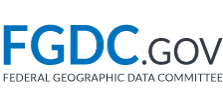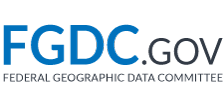Persons Attending
Gerry Barton (Commerce); Fred Broome, Leslie Godwin (Cultural and Demographic); Dave Catlin (EPA); Carolyn Davis (FEMA); Richard Hogan (Standards); Fred Kaiser (Vegetation); Dick Kleckner (Base Cartographic); Millington Lockwood (Bathymetric); M.K. Miles (Facilities); Janet Morton, John Pallister (Geologic); Tim Smith (Water); Bruce Spear (Ground Transportation); John Spencer (Geodetic); John Stewart (DOE); Brad Thomas (International Boundaries); Charles Thomsen (HUD); Gene Thorley (Chair); Dan Webb (Cadastral); Bill Wilen (Wetlands); John Moeller, Mickey Kilpatrick, Doug Nebert, Barbara Poore (FGDC Secretariat).
Information Items
Summary Report of August Coordination Group meeting was approved; action items are complete. Mr. Moeller announced that a framework strategy group meeting is scheduled for September 19 at Main Interior. Representatives of those subcommittees and working groups with framework components and others with strong framework interests will work on developing a process for an integrated framework implementation strategy
GIS/LIS November 16-22, 1996.--FGDC will provide a booth to highlight NSDI progress. Ms. Poore solicited digital file input of theme applications from Coordination Group members to be used to create displays for the booth. Mr. Moeller noted that two NSDI panel sessions are planned on November 20: (a) Implementing the Vision--Technical Considerations, and (b) Building the NSDI Through Partnerships. Coordination Group members or others who are knowledgeable about NSDI and FGDC are invited to participate as moderator or panelist on either of these sessions. Action: Provide the name of interested prospective panelist or moderator to John Moeller, telephone (703)648-4636.
Discussion Items
Standards Working Group
Mr. Hogan reported on the status of several FGDC standards under development, and appealed to the Coordination Group for continued support in reviewing and commenting on the various standards and standards proposals being reviewed. Mr. Hogan noted that he had made standards presentations at two subcommittee meetings, Base Cartographic and Geologic, and that some very interesting cooperation is being established between the Geologic Subcommittee and the Association of State Geologists, who have a well structured standards process in place.
Mr. Hogan stated that the Information Infrastructure Standards Panel (IISP) Working Group for GIS is making efforts to direct the activities of standards-setting bodies. The FGDC may see guidance from them in the areas of Intelligent Transport Systems (ITS) and imagery. The IISP includes representatives of the vendor community.
Mr. Barton raised a NOAA concern about wetlands vegetation classification; however, the issue was not clearly defined. Action: Wetlands Subcommittee chair to work with NOAA to define the issue, and then will work issue with Vegetation and Earth Cover groups and report at October 8 Coordination Group meeting.
Clearinghouse Update
Mr. Nebert, clearinghouse coordinator, highlighted development of software tools that extend search capabilities through the clearinghouse. For example, the ISite server and indexer software can search frequently used fields selected from a menu on a form. Users are not required to enter geographic coordinates to identify areas of interest, although the software does accommodate coordinates.
Mr. Hogan noted that clearinghouse is one implementation of the metadata standard; SDTS is another. Coordination Group members from a few agencies expressed frustration in understanding how to proceed with preparing metadata products using the metadata standard, which is a standard for content only. Development of interim guidelines for the encoding of FGDC metadata was suggested as a means to assist with initial implementation. Action: FGDC Staff (Tolar/Nebert) to develop interim guidelines for the encoding of FGDC metadata. A progress report will be provided at the October 8 Coordination Group meeting.
Mr. Thorley noted that this agenda item was intended to be a briefing on the status of Clearinghouse development and not an in-depth technical problem solving session. He suggested that efforts to solve such issues be worked through full agency participation in the technical working groups and those avenues exhausted before issues are brought to the Coordination Group.
A plan for full implementation of the clearinghouse is being developed by the clearinghouse coordinator (Nebert), with input from the FGDC staff, the clearinghouse discussion group, and the Coordination Group. Action: Coordination Group members are asked to contact Doug Nebert (ddnebert@usgs.gov) by September 27 with any ideas on the vision of a fully implemented clearinghouse and suggested actions to move toward full implementation.
Mr. Nebert provided an overview of search capabilities of the Naval Research Lab s software tools. He also noted that training will soon be available on how to set up a clearinghouse server.
Preparation for September 11 Steering Committee Meeting
Mr. Moeller provided an overview of agenda items for the upcoming Steering Committee meeting:
Hammer Award: The Hammer Award is Vice President Gore s recognition of teams that have demonstrated excellence in reinventing government, cutting costs, and finding ways of better serving our communities. At the September 11 meeting, the FGDC as a team will receive a Hammer Award and Certificate. Each Steering Committee member will receive a Certificate, and a plaque will be delivered later for each agency. At the September 11 meeting, agency representatives will be encouraged to further recognize participants within their agencies who have been active in any FGDC subcommittees or working groups.
State Council Issues: One of several actions identified at the April Steering Committee meeting with council representatives was to develop mechanisms to increase understanding of NSDI and related agency responsibilities under the Executive Order, particularly for State and regional components of Federal organizations. The Steering Committee agreed to focus on this action in the coming year; Coordination Group members might be thinking of how to assist in this effort. There was also approval of inviting broader participation of councils in the standards development process; a letter has been sent to councils inviting this participation. Ongoing discussions with national groups such as the National Association of Counties and the National States Geographic Information Council will further define how we will work together to develop NSDI. Other organizations, such as the National Governors Association and the American Planning Association, will be contacted as opportunities arise.
In a letter following the April 30 Steering Committee meeting, State councils were invited to submit one or two specific issues that would be appropriate for initial FGDC/State council cooperative action. Some States have yet to respond, so a consolidated response is not yet available; however, an idea presented by the Utah council merits discussion at this time. The Utah council suggested that the FGDC help facilitate a data sharing agreement between Utah and the principal Federal agencies within the State of Utah. Using existing agreements with Federal components in Utah, a draft agreement was developed. The Coordination Group concurred with considering that FGDC assist in the development of this agreement; the suggestion will be presented to the Steering Committee for their recommendation.
NSDI Strategy: Mr. Moeller noted that discussions had been held over the past few months with groups such as the Mapping Sciences Committee, URISA, and others, to reflect on the strategy put forth in the 1994 Strategic Plan and to determine what changes might be needed in light of progress made since that plan was drawn. The consensus is that the vision is still correct. The revised strategy that has been developed focuses on a few high level strategic goals with objectives under the goals. Tactical plans and implementation actions will be developed in a separate document(s). This strategy document covers 1996-2000. Mr. Moeller proposed that this draft document be presented to the Steering Committee for review and reaction, and also be reviewed by the broader community. The process is expected to take about 6-8 weeks.
Mr. Moeller briefly reviewed the strategy document s three goals, which will be the focus of discussion at the Steering Committee meeting. Mr. Wilen asked that an additional objective be shown under the second goal to include non-framework theme data: to establish and maintain thematic data sets that meet critical national needs. The Coordination Group agreed; this objective will be added. Ms. Morton suggested that, for the first goal we be more specific about whose awareness and understanding we mean. Coordination Group members agreed that this could be covered in the objectives and through implementation plans.
Ms. Poore suggested that the strategy document remain stable through the review process, with comments collected and acted on when review is complete. Mr. Thorley agreed with this; however, he suggested that in the case of obvious omissions (such as Mr. Wilen s suggestion), changes should be incorporated before further review.
Mr. Smith noted that this document addresses only one element of strategic planning (direction setting) and does not consider other elements of strategic planning (e.g., external environment, budgetary resources). Mr. Smith commented that, if that is the intention, some mention might be made to that effect. The Coordination Group agreed to drop the word plan from the document title because of the implications it carries.
The Coordination Group also agreed that Steering Committee members could decide what reviews were desirable within their agencies. Mr. Lockwood noted that review of a document does serve to increase awareness of the topic, and provides an opportunity to make a connection with agency planning mechanisms.
Identification of Cooperative Projects for Steering Committee Briefings: Mr. Moeller noted that the Secretary is interested in hearing about successful data sharing projects as a means to keep Steering Committee members informed and interested in the progress in this activity. The Coordination Group will identify a few projects from which the Steering Committee can choose a presentation for the December meeting. Thereafter, we will maintain a list of 3-5 activities from which they can choose briefings for following meetings. Some guidance criteria will be needed to keep the focus on NSDI. (Presentations should not be technical nuts and bolts, but should consider such factors as solving community problems, involving multi agency efforts, saving dollars, changing policies, and should provide summary information 2-3 weeks before presentation to enable appropriate prebriefing.)
Mr. Moeller suggested that we begin with the matrix that we collected earlier this year. Discussion resulted in identification of four projects to submit for consideration by the Steering Committee for presentation at the December meeting: (1) National Interagency Fire Center; (2) SAST--Midwest floods; (3) South Florida Ecosystem; and (4) Alaska-Prince William Sound and Glacier Bay Ecosystem.
Scheduling Agenda Items in Advance
Action (as needed): Coordination Group members who wish to bring new business to Coordination Group meetings are requested to provide information about the item to Mickey Kilpatrick two weeks before the meeting. Any handouts should be provided in time to allow appropriate review before the meeting.
Any member who wishes to place a last minute item on the agenda may do so at the beginning of the meeting, but such items will be placed at the end of the agenda and dealt with as time allows.

